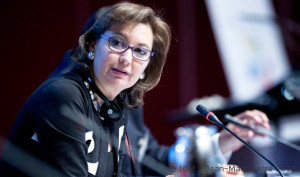Global migration needs better management – IOM

Laura Thompson, IOM Director-General
There are more than 120 million working migrants around the world making vital economic and social contributions to their adopted countries, according to the International Organisation of Migration (IOM).
And cross nation migration is a natural human phenomenon that is near impossible
to stop, the IOM’s Vice-Director General said this week.
Speaking on European radio IOM Vice-Director General Laura Thompson said it was impossible to stop illegal migration without stepping up legal channels for international work migration.
But she said there was a need for an international agreement of ethical recruitment to prevent the exploitation of migrant workers, particularly from the developing world.
“Migration is a natural phenomenon. You can’t stop it. Migration will continue to happen regardless of whether you have regular channels or not,” Ms Thompson said.
“When people are chased or persecuted then people move naturally to places where they see more chance for a better life for themselves.
“The impact in Europe is not as big as one could image when you turn on your television or open up your newspaper.
“The reality of migration is that today south-north migration is as big as south-south migration.
“We talk about 230 million international migrants and from this 230 million we have around 60 million that are considered people who have been forced to move,” Ms Thompson said.
She said the majority of migrants wanted to work and that migration was fundamental to the global economy.
“At least 50 per cent of these 230 million people are workers and you have in this category of people we have all types of qualifications. The contributions of migrants are extremely important for countries,” Ms Thompson said.
“There is a lot of research around the world that proves that migrants are making important contributions to countries particularly in terms of innovation, research, trade and investment,” she said.
“Migrants are more entrepreneurial and more willing to take bigger risks than the normal population. For instance, in the United States you have a large number of big companies, important companies, that were started by migrants,” she said.
“So, migrants are part of the global economy and they make an important contribution to it. Also, they send a large amount of remittances to their countries of origin. Around $US440 billion is sent in economic remittances by diasporas to their countries of origin each year.”
Ms Thompson said one of the issues relating to global migration was the working condition imposed on lower qualified migrant workers in some parts of the world.
“Very often these migrants enter countries in irregular conditions where there are no specific regular systems of migration to bring in lower qualified migrants,” she said.
Ms Thompson said the IOM was working to promote an integrity system for international recruitment to ensure that the agencies that participate in the system follow standards and principles of fair and ethical recruitment.
“This is so migrants that go to those agencies know that the offers they receive are correct, that wages will be paid; and also that the companies involved in recruiting migrants know that the migrants they recruit have the skills that they need,” she said.
“But again if you open regular channels of migration then obviously you have less abuse and more protection for the migrants.”
Ms Thompson said there was also a need to try to change prejudice and discrimination against migrants.
“There are a lot of reasons to try to change the rhetoric about migration in Europe and in other regions; there is a very negative perception about migrants and migration and the reality is that there are economic, geographic and other reasons that make it important for these countries to have the participation of migrants,” Ms Thompson said.
“And if we manage to engage others in an evidence-based discussion about migration; how many are needed, and for how long and if we can manage to open regular channels of migration that allow people to come, work and go back knowing they can come again and again, we will make this human mobility a much better system where people feel free to move around without entering into irregular and possibly exploitative situations,” she said.
Sheree Peterson
AMES Staff Writer












